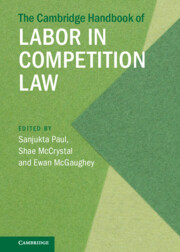Book contents
- The Cambridge Handbook of Labor in Competition Law
- The Cambridge Handbook of Labor in Competition Law
- Copyright page
- Contents
- Contributors
- Preface
- 1 Labor in Competition Law
- 2 Collective Labour Rights for Working People
- 3 Economic Coordination as Freedom of Association
- 4 The State’s Power to Govern in This Field Is Paramount: Antitrust, Labor, and the First Amendment
- 5 Competition Law as Collective Bargaining Law
- 6 Antitrust, Free Trade, and Fissuring
- 7 American Antitrust Exceptionalism
- 8 Competition and Labour Law in Canada
- 9 Workers and Competition Law in Japan
- 10 Workers and Competition Law in Australia
- 11 Workers and Competition Law in New Zealand
- 12 Competition Law and Labour Law
- 13 Workers and Competition Law in India
- 14 Competition and Labour Law in the United Kingdom
- 15 A Solution in Search of a Problem?
- 16 Competition and Labour Law in Germany
- 17 Labour Law and Competition Law Under French Regulation
- 18 Competition Law, Cartels and Collective Bargaining
- 19 The EU, Competition Law and Workers Rights
- 20 Is South American Collective Labor Law Confronted by Competition Law?
- 21 Conclusion
14 - Competition and Labour Law in the United Kingdom
History, Theory and Practice
Published online by Cambridge University Press: 05 May 2022
- The Cambridge Handbook of Labor in Competition Law
- The Cambridge Handbook of Labor in Competition Law
- Copyright page
- Contents
- Contributors
- Preface
- 1 Labor in Competition Law
- 2 Collective Labour Rights for Working People
- 3 Economic Coordination as Freedom of Association
- 4 The State’s Power to Govern in This Field Is Paramount: Antitrust, Labor, and the First Amendment
- 5 Competition Law as Collective Bargaining Law
- 6 Antitrust, Free Trade, and Fissuring
- 7 American Antitrust Exceptionalism
- 8 Competition and Labour Law in Canada
- 9 Workers and Competition Law in Japan
- 10 Workers and Competition Law in Australia
- 11 Workers and Competition Law in New Zealand
- 12 Competition Law and Labour Law
- 13 Workers and Competition Law in India
- 14 Competition and Labour Law in the United Kingdom
- 15 A Solution in Search of a Problem?
- 16 Competition and Labour Law in Germany
- 17 Labour Law and Competition Law Under French Regulation
- 18 Competition Law, Cartels and Collective Bargaining
- 19 The EU, Competition Law and Workers Rights
- 20 Is South American Collective Labor Law Confronted by Competition Law?
- 21 Conclusion
Summary
What is the proper relationship between competition and labour law? In the UK since at least 1906 every real ‘person’ has had ‘freedom of association’ and is free to take collective action in a ‘trade dispute’, whether an employee, or self-employed. This principle was necessary for fair competition, fair working time, and fair wages. It forms a cornerstone of labour relations. The UK’s experience informed US antitrust law, the International Labour Organisation, and the Universal Declaration of Human Rights. ‘Everyone’ in international law has the right to ‘just and favourable remuneration’, to join unions for ‘the promotion’ of their ‘social interests’, and the ‘right to strike’. UK and international law equally influenced EU law. Like all EU members states, since World War Two the UK has never used competition rules to suppress unions. This chapter explains the law on combinations, conspiracy and restraint of trade. Modern competition law, focused on undertakings, developed to break private monopoly power of unaccountable corporations, not to suppress fair wages and voice at work. Cases of collective action from self-employed barristers, to drivers and book dealers illustrate this. Competition law’s proper focus is unaccountable corporate power, to build a plural, more democratic economy.
Keywords
- Type
- Chapter
- Information
- The Cambridge Handbook of Labor in Competition Law , pp. 208 - 222Publisher: Cambridge University PressPrint publication year: 2022



